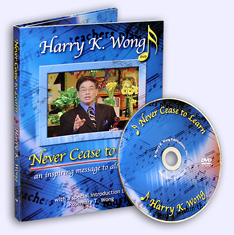
Seamless, Transparent, and Consistent

Christina Shoemaker (center) with her music
department colleagues, Kirk Hickman (left) and
Bert Johnson (right) department chair |
This has happened to all of us—“You have a second?” plea from a co-worker.
Christina Shoemaker was on her way to teach her 7th period Concert Choir class at Lincoln-Way North High School in Frankfort, Illinois, when she was stopped in the hallway by a colleague. The conversation ended up lasting about 8 minutes into the 7th period class.
Then, she was greeted with a wonderful sight. |
|
Christina Shoemaker feared the worse. What would greet her when she was 8 minutes tardy for her own class? As she entered the door, there was the Concert Choir partially through their warm-ups! She asked them what they were doing and they told her they just went ahead and started class without her!
She asked what they had done so far. They responded that they had worked silently on their bellringers. Then, students volunteered to put the answers to the bellringer on the board. Next, they continued on with the procedure and
one student simply read the announcements found
on the teacher’s music stand.
After announcements, they began to write in the solfege for the sight-reading exercise so the class could get a head-start. After that, one of the class officers initiated the stretches and breathing to begin the warm-up.
The students did not miss a note in starting the class. Christina was ecstatic with how the class was proceeding without her.
Christina began her teaching career with a plan ready to put in place. She knew how to set up and manage a classroom in such a way that the students would know how to function responsibly on their own without the teacher in the classroom.
Christina was no stranger to a well-managed classroom. She was a product of classrooms that were organized and consistent so there was time for teaching and learning. She says,
“I went from Lincoln-Way East as a high school student to Bradley University and back to Lincoln-Way North as a teacher and at each of these places, the organization and procedures were consistent.”
Flashback
Christina was a high school student in the music department at Lincoln-Way East High School in Frankfort, Illinois. As a student, she simply followed the procedures in her classroom and found them acceptable because the school experience was rewarding and “fun” for her. The teacher who created this atmosphere for Christina was Mrs. Lambert, her music teacher in her junior year. Christina describes Mrs. Lambert as, “Someone who teaches music as a part of life and that it is closely tied to a person’s soul and character. Mrs. Lambert changed my life.”
Christina watched Mrs. Lambert closely in her junior and senior years, observing her teaching style and her interactions with students. Her classroom was a place where great order existed and it was out of that order and structure that great musical expression was achieved.
Christina reflects that because of the organization of the classroom, Mrs. Lambert was never too busy to talk to her about music, or teaching, or life. She had time to connect with students. (Unlike teachers who are too busy handling behavior problems leaving little, if any, time to connect with other students in the class.)
In Christina’s words, “Mrs. Lambert encouraged me to become a music teacher and it was her influence, her confidence, and her guidance. Her faith instilled in me that I could possibly succeed at teaching this passion: music.”
Christina was enamored with her teachers, first in the 2nd grade, then in 4th grade, then in 5th grade, and then all of her high school English teachers. It became obvious to her that the classes she wanted to teach were directly related to the teachers, whom she admired, that taught them. She says, “Those teachers were passionate, caring, helpful, and understanding and were people I desperately wanted to emulate. These experiences were the foundation for the kind of teacher and person that I try to be every day in the classroom.”
Today, Christina (on the left) and Alysia Lambert, “Mrs. Lambert,” are friends and now professional colleagues, who communicate daily.
Christina went to Bradley University and experienced another culture of consistency in the Music Department there. Her professors were passionate and stimulating and always working to make their students better musicians, teachers, and people. Then, in her junior year she enrolled in a Classroom Management class. The adopted textbook was The First Days of School and Christina sheepishly admits, “I didn’t even know it existed not to mention, ‘Who are the Wongs?’”
Dr. Victoria Huffman was the course instructor and she brought the book and the video, The Effective Teacher, to life. When Christina first started reading the book and watching the videos, she says, “Everything that I believed about order and structure were right here! I couldn’t wait to start working on my Classroom Management plan because it had happened to me when I was a high school student.”
Christina says that she took the class project very seriously because she knew that it would only be a matter of time before she would be using it in her own classroom. The project guided her to organize her own thoughts into a practical and useable plan for her future students.
Amazingly, most all of the procedures
she came up with in that project
are currently in use in her classroom today!
Flash Forward—Christina Becomes a Teacher
Christina returned to teach in her OLD high school district and all of a sudden the whole concept of organization with procedures was a major Aha that made sense, but more importantly worked for her and her students.
She realized that from the moment a student steps into the classroom, they need to know what to expect. The procedure for every class period is the same—a culture of consistency—with the objectives for the day always listed on the board. Class begins immediately at the bell and the class works for the full 50 minutes, right up until the next bell, making full use of instructional time.
Procedures for Starting Class
- Students enter the room, pick up their assigned music folder from the cabinet, are seated, and immediately begin to complete the assigned Bell Work in their Bell Work notebook.
- At the bell, which signifies the start of class, students are in their seats working silently on the Bell Work. The Bell Work ranges from topics on music theory to music history to personal growth.
- During the Bell Work, attendance is taken from the seating chart so that the flow of class is not interrupted.
- If students complete the Bell Work, they are to copy the learning objective into their daily learning target journal.
- When students complete the Bell Work, the topic is discussed and questions are answered.
- Bell Work is followed by brief announcements on classroom details and extracurricular activities so as to not interrupt the music environment.
- Approximately 5 minutes into the start of class, the warm-up exercises begin:
- Stretching: to facilitate better posture and freedom of the voice
- Breathing exercise: to engage the breathing mechanism and prepare for breath management while singing
- Vocal exercises: to work on opening the tone, forward placement, articulation, range, and relaxation while striving for freedom, energy, and beauty
- Scales: Major, Natural Minor, Harmonic Minor, Melodic Minor, and Chromatic
- Triads: Major, Minor, Diminished, and Augmented
- Intervals: Major, Perfect, and Minor
- Other: a variety of solfege exercise
Class Schedules
- Weekly schedule is written on the board for each class which includes the music that will be sung each day and the topics to be covered.
- Daily schedule is visible on the Bell Work board that includes the order of pieces and the learning target for the day.
Procedures for Starting Class
- Students will raise their hands and wait for permission to speak.
- Students will request permission from the teacher to use the restroom if it is an
emergency only and will carry the hall pass with them. In all other cases, the restroom is to be used during passing periods.
- Students may leave their seats to get a drink of water, sharpen pencils, or get a tissue only when the instructor is not working with their particular section.
- Two minutes before the end of class is reserved for students to complete their learning target journal in which a self-assessment of individual progress during that day is made. When the journal is completed, students are allowed to move about the room to return their folders to the cabinet.
Christina’s Greatest Joy
At the beginning of the year the procedures are presented to the students in a handout as a part of the syllabus and taught on the first day and reinforced throughout the first week.
Christina has a poster with the classroom procedures that she hangs in the classroom. Click here to see Christina’s poster with the classroom procedures.
The students also get a copy with the class syllabus. The syllabus was adapted from syllabi she has collected through the years, from Alysia Lambert, and from the syllabi used by the other two teachers in the music department so there is consistency of procedures within the department. She says, “My syllabus is a work in progress as I update it each year with my newest ideas.”
Click here to see Christina’s class syllabus.
Christina says that she admires the syllabus used by music teacher Nile Wilson we shared in our December 2008 column. Click here to see this syllabus.
But, Christina’s greatest joy is forming meaningful relationships with her students and sharing her love of choral music with them.
“It is incredibly gratifying to watch them fall in love with choral music, to work their very hardest, and to achieve high levels of success.
“My advice to any new teacher would be to set up your own classroom procedures before the students get to school and be confident in them. Then teach them thoroughly and consistently until they are mastered. If you do that, you will be able to truly enjoy teaching your students!
“My teaching is a reflection of the wonderful teachers I have had and this is a great way to honor them as well.”
The Power of Influence
Each day in millions of classrooms, teachers blaze the route for futures untold. Our every move, every action, and every word is scrutinized, analyzed, and synthesized, and then either accepted or rejected by our students. We are examples of what can be, what the future holds. We can be a negative influence with our disgruntled attitudes, absence of care, and lack of dedication to our chosen profession. Or we can leave a positive mark in the beliefs of students so they are equipped to make choices for their future.
Your influence in the classroom has a ripple effect with no foreseeable edge in sight. There is a Mrs. Lambert in each of us—someone who creates the music in students for generations to experience. May your music be heard loud and clear by each of your students.
 For a printable version of this article click here. For a printable version of this article click here.
|

About Effective Teaching...
Harry and Rosemary Wong have been writing columns for Teachers.Net for over 13 years and the columns all have a distinctive style. They write about effective teachers, administrators, schools, and school districts featuring techniques that are immediately replicable and at no cost. More importantly, they work to enhance student learning. An archive of past articles can be found at the end of every column, with an abstract of all articles at the end of the most recent June column.
For over 30 years, helping teachers become effective has been the passion of the Wongs. Writing for Teachers.Net is just one of the many ways they reach out to educators with their ideas on how effective teachers improve student learning.


About Harry & Rosemary Wong...
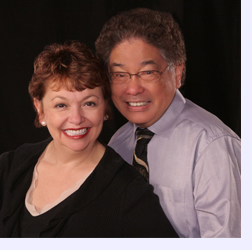 Harry and Rosemary Wong are teachers. Harry is a native of San Francisco and taught middle school and high school science. Rosemary is a native of New Orleans and taught K-8, including working as the school media coordinator and student activity director. Harry and Rosemary Wong are teachers. Harry is a native of San Francisco and taught middle school and high school science. Rosemary is a native of New Orleans and taught K-8, including working as the school media coordinator and student activity director.
Harry Wong has been awarded the Horace Mann Outstanding Educator Award, the National Teachers Hall of Fame Lifetime Achievement Award, the Science Teacher Achievement Recognition Award, the Outstanding Biology Teacher Award, and the Valley Forge Teacher's Medal. He was selected as one of the most admired people in education by the readers of Instructor magazine. Rosemary was chosen as one of California's first mentor teachers and has been awarded the Silicon Valley Distinguished Woman of the Year Award. She was also honored as a Distinguished Alumnus from her alma maters, Southeastern Louisiana University and Louisiana State University.
Harry and Rosemary have been awarded the Upton Sinclair Award and were nominated for the Brock International Prize in Education. They have built and sustain a school in the jungles of Cambodia.
The Wongs are the most sought after speakers in education today, booked two years into the future. Their presentations are practical, offering a common sense, user-friendly, and no-cost approach to managing a classroom for high-level student success. Over a million teachers worldwide have heard their message. In spite of their heavily booked schedule, Harry and Rosemary have agreed to write this monthly column so that more people can hear their message.


How They Develop Effective Teachers...
Harry and Rosemary Wong are committed to developing effective teachers, one teacher at a time.
To do this, they have formed their own publishing company, of which Rosemary is the CEO.
THE Classroom Management Book is what everyone has been waiting for. It is an exhaustive extension of Unit C on classroom management in The First Days of School.
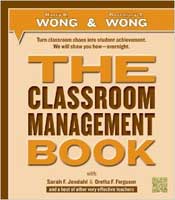 |
- Turn chaos into student achievement
- Reduce behavior issues; increase learning
- Step-by-step plans to a well-managed classroom
- 50 procedures in detail
- 40 QR codes with additional resources
- 320 pages in full color
- Complete first days of school plans
- Suitable for all grades, all subjects, all teachers
- Costs no money to implement
|
How to Be an Effective and Successful Teacheris an audio CD set that was recorded live before 800 teachers in St. Louis. Listen as they walk you through classrooms that hum with learning and share how you can replicate the same success in your classroom. In 2 hours and 40 minutes, Harry and Rosemary can transform you into a very effective and successful teacher at no cost!
This presentation has transformed the lives and teaching success of hundreds of thousands of teachers.Learn how to
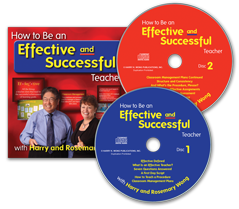 |
- Begin the school year with a plan
- Start class immediately
- Have a well-organized and structured classroom
- Reduce discipline problems
- Have students who are engaged and working
- Teach procedures and responsibility
- Maximize classroom instructional time
- Use lesson objectives so students know what they are to learn
- Use rubrics to assess for student learning
- Deal with at-risk students
- Improve student learning and achievement
|
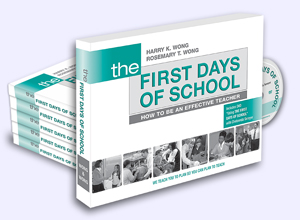 |
The Wongs have written The First Days of School, the best-selling book ever in education. Over 3.8 million copies have been sold. It is used in 120 countries, 2,114 colleges, and most every new teacher induction program. The fourth edition has been translated into five foreign languages and includes:
- An additional chapter on procedures
- A new chapter on assessment with rubrics.
- A new chapter on Professional Learning Teams
- A new chapter for administrators on implementation
- Additional information in Going Beyond Folders
- A new DVD, Using THE FIRST DAYS OF SCHOOL, presented by Chelonnda Seroyer
|
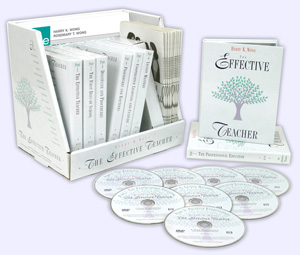 |
The Wongs have also produced the DVD series, The Effective Teacher, winner of the Telly Award for the best educational video of the past twenty years and awarded the 1st place Gold Award in the International Film and Video Festival. |
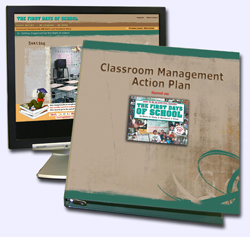 |
They also have a successful eLearning course, Classroom Management with Harry and Rosemary Wong. The course can be taken in private at the learner's convenience. The outcome of the course is a 2 inch binder with a personalized Classroom Management Action Plan.
This Action Plan is similar to the organized and structured plan used by all effective teachers. Details for the classroom management course can be seen at www.ClassroomManagement.com. |
|
You can hear Harry Wong LIVE on a set of CDs, called
How to Improve Student Achievement, recorded at one
of his many presentations. He invites you to steal from him the secrets of effective teaching for all grade levels. |
|
Never Cease to Learn has the power to transform your
attitude and your life. In this DVD, Harry shares his journey on the road to success and tells listeners how to become the educators they were meant to be. |
When the books, video series, CD, DVD, and eLearning course are used together, they form the most effective professional development training tool for producing effective teachers. Staff developers and administrators who would like to know how to implement the aforementioned book, video series, and CD are encouraged to consult the book, New Teacher Induction: How to Train, Support, and Retain New Teachers. Information about these products can be found by visiting the publisher's website at www.HarryWong.com.
Helping you produce effective teachers is our passion.
|

Harry & Rosemary Wong Columns on Teachers.Net...
If you spot a link that appears to be out-of-date, please alert us at webmaster@teachers.net!
- A Grateful Goodbye After 15 Years (Jun 2015)
- Love, Marriage, and Babies, Oh My! (May 2015)
- Retention Rate Is 100 Percent (Apr 2015)
- Teacher Effectiveness and Human Capital (Mar 2015)
- Training Teachers to Be Effective (Feb 2015)
- Making Deals Is Ineffective (Dec 2014 / Jan 2015)
- Retrieving and Carrying Electronic Devices (Nov 2014)
- Sharing to Succeed (Oct 2014)
- How a University Prepares Its Students (Sep 2014)
- Effective Teaching (Aug 2014)
- Your Future Is in Your Hands (June/July 2014)
- The Classroom Management Book (May 2014)
- When Students Succeed; Teachers Succeed (April 2014)
- Teaching New Teachers How to Succeed (March 2014)
- Execute and Praise (February 2014)
- Shaping a Solid Foundation (Dec 2013 / Jan 2014)
- The Most Misunderstood Word (November 2013)
- How to Start Class Every Day (October 2013)
- Prevention: The Key to Solving Discipline Problems (September 2013)
- Planning, Planning, Planning (August 2013)
- Are You THE One? (June / July 2013)
- Practical Examples That Work (May 2013)
- A Disability Is Not a Handicap (Apr 2013)
- Totally Inexcusable (Mar 2013)
- Be Proud of Public Education (Feb 2013)
- Structure Will Motivate Students (Dec 2012 / Jan2013)
- Orchestrating the Classroom (Nov 2012)
- The Lasting Impact of Instructional Coaching (Oct 2012)
- Learning, Laughing, and Leaving a Legacy (Sep 2012)
- Twenty-two, First Year, and Legit (Aug 2012)
- A Master Teacher of Teachers (June/July 2012)
- Where Going to School Means Success (May 2012)
- A Nationally Celebrated High School (Apr 2012)
- The Highest Rated School in New York City, Part 2 (Mar 2012)
- The Highest Rated School in New York City, Part 1 (Feb 2012)
- The Importance of Culture (Dec 2011 / Jan 2012)
- You Can Teach Classroom Management (Nov 2011)
- Seamless, Transparent, and Consistent (Oct 2011)
- Coaching Teachers to Be Effective Instructors (Sep 2011)
- How a Principal Creates a Culture of Consistency (Aug 2011)
- Graduation Begins in Your Classroom (June/July 2011)
- The Inspiration of a Mother (May 2011)
- How to Be an Effective Leader (Apr 2011)
- Learning Objectives: The Heart of Every Lesson (Mar 2011)
- Even Shakespeare Had Structure (Feb 2011)
- Effectiveness Defined: It's Not a Mystery (Dec 2010 / Jan 2011)
- Surviving Without a Principal (Nov 2010)
- Achieving Greatness: Locke Elementary School, Part 2 (Oct 2010)
- Teaching Greatness: Locke Elementary School, Part 1 (Sep 2010)
- Effective from the Start (Aug 2010)
- Ten Year Summary of Articles, 2000 to 2010 (June/July 2010)
- The Success of a Culture of Consistency (May 2010)
- Training Teachers to Be Effective (Apr 2010)
- Learning to Teach, Teaching to Learn (Mar 2010)
- Turning Teaching Dreams into Reality (Feb 2010)
- Dreams and Wishes Can Come True (Dec 2009 / Jan 2010)
- Success in a State Controlled School (Nov 2009)
- Inner City Is Not An Excuse (Oct 2009)
- Exceeding All Expectations (Sep 2009)
- Teachers Are the Difference (Aug 2009)
- Nine Year Summary of Articles, 2000 to 2009 (Jun/Jul 2009)
- Teachers Are the Greatest Assets (May 2009)
- The Tools for Success (Apr 2009)
- Assessing for Student Learning (Mar 2009)
- To Be an Effective Teacher Simply Copy and Paste (Feb 2009)
- The Sounds of Students Learning and Performing (Dec 2008)
- A School That Achieves Greatness (Nov 2008)
- Boaz City Schools: Professional Learning Teams (Oct 2008)
- It Was Something Close to a Miracle (Sep 2008)
- A Computer Teacher Shows the Way (Aug 2008)
- Eight Year Summary of Articles, 2000 to 2008 (Jun/Jul 2008)
- An Amazing Kindergarten Teacher (May 2008)
- Schools That Beat the Academic Odds (Apr 2008)
- Academic Coaching Produces More Effective Teachers (Mar 2008)
- Coaches Are More Effective than Mentors (Feb 2008)
- Wrapping the Year with Rap! (Dec 2007/Jan 2008)
- The Floating Teacher (Nov 2007)
- Taking the Bite Out of Assessment—Using Scoring Guides (Oct 2007)
- Ten Timely Tools for Success on the First Days of School (Sep 2007)
- First Day of School Script - in Spanish, Too! (Aug 2007)
- Seven Year Summary of Articles, 2000 to 2007 (Jun 2007)
- Effective Teachers End the Year Successfully (May 2007)
- Training Gen Y Teachers for Maximum Effectiveness (Apr 2007)
- Classroom Management Applies to All Teachers (Mar 2007)
- Students Want a Sense of Direction (Feb 2007)
- Rubrics in Two College Classes (Dec 2006/Jan 2007)
- How to Write a Rubric (Nov 2006)
- Assessing Student Progress with a Rubric (Oct 2006)
- A 92 Percent Homework Turn-in Rate (Sep 2006)
- Effective Teachers Are Proactive (Aug 2006)
- Five Year Summary of Articles (Jun 2006)
- Hitting the Bulls Eye as a Beginning Teacher (May 2006)
- They're Eager to Do the Assignments (Apr 2006)
- The Success of Special Ed Teachers (Mar 2006)
- What Teachers Have Accomplished (Feb 2006)
- Fifty Years Ago, The Legacy (Dec 2005/Jan 2006)
- The Emergency Teacher (Nov 2005)
- Classroom Management Is Not Discipline (Oct 2005)
- A Successful First Day Is No Secret (Sep 2005)
- The Most Important Factor (Aug 2005)
- Four Year Summary of Articles (Jul 2005)
- Improving Student Achievement Is Very Simple (Part 2) (Jun 2005)
- Improving Student Achievement Is Very Simple (Part 1) (May 2005)
- Never Cease to Learn (Apr 2005)
- His Classroom Is a Real Life Office (Mar 2005)
- The Power of Procedures (Feb 2005)
- The First Ten Days of School (Jan 2005)
- PowerPoint Procedures (Nov/Dec 2004)
- The Saints of Education (Oct 2004)
- How Procedures Saved a Teacher's Life (Sep 2004)
- How to Help Students with Their Assignments (Aug 2004)
- Three Year Summary of Articles (Jun/Jul 2004)
- His Students are All Certified (May 2004)
- What to Do When They Complain (Apr 2004)
- A Well-Oiled Learning Machine (Mar 2004)
- The Effective Teacher Adapts (Feb 2004)
- How to Start a Lesson Plan (Aug 2003)
- Applying for a Teaching Job in a Tight Market - Part 2 (Jun/Jul 2003)
- Applying for a Teaching Job in a Tight Market (May 2003)
- The Effective Substitute Teacher (Apr 2003)
- A First Day of School Script (Mar 2003)
- How to Retain New Teachers (Feb 2003)
- No Problem With Hurricane Lili (Dec 2002)
- A Class Size of 500 (Nov 2002)
- Effective Practices Apply to All Teachers (Oct 2002)
- Dispensing Materials in Fifteen Seconds (Sept 2002)
- How To Start School Successfully (Aug 2002)
- Teaching Procedures Is Teaching Expectations (June - July 2002)
- $50,000 to Replace Each Teacher (May 2002)
- Even Superintendents Do It (Apr 2002)
- Impossible, No Job Openings? (Mar 2002)
- A Stress Free Teacher (Feb 2002)
- A Most Effective School (Jan 2002)
- Van Gogh in Nine Hours (Dec 2001)
- The Effective Teacher Thinks (Nov 2001)
- How a Good University Can Help You (Sep 2001)
- How to Motivate Your Students (May 2001)
- How to Recognize Where You Want to Be (Apr 2001)
- What Successful New Teachers Are Taught (Mar 2001)
- A Journey of the Heart (Feb 2001)
- The Miracle of Teachers (Jan 2001)
- It's Not the Students. It's the Teacher. (Dec 2000)
- The First Five Minutes Are Critical (Nov 2000)
- How to Start a Class Effectively (Oct 2000)
- The Problem Is Not Discipline (Sep 2000)
- There Is Only One First Day of School (Aug 2000)
- Applying for Your First Job (Jul 2000)
- Your First Day (Jun 2000)

Related Resources & Discussions on Teachers.Net...
|
|











